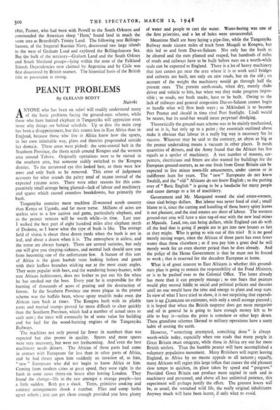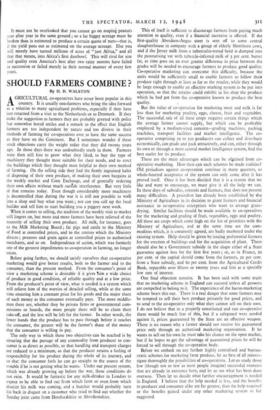PEANUT PROBLEMS
By CLELAND SCOTT Nairobi
ANYONE who has been on safari will readily understand many of the basic problems facing the ground-nuts scheme, while those who have hunted elephant in Tanganyika will appreciate even more why things are behind schedule. Up to date the main crop has been a disappointment, but this counts less in East Africa than in England, because those who live in Africa know how she upsets, in her own inimitable way, plans and theories propounded outside her domain. Three areas were picked: the semi-coastal belt in the Southern Province, the thorn scrub around Kongwa and the western area around Tabora. Originally operations were to be started in the southern area, but someone rashly switched to the Kongwa district. To the untutored eye this looked best, as there were few trees and only bush to be removed. This error of judgement accounts for what sounds the paltry total of to,000 instead of the expected 15o,000 acres. There were other reasons for this com- paratively small acreage being planted—lack of labour and machinery and spares which caused countless breakdowns, but primarily the bush.
Tanganyika contains more trackless ill-watered scrub country than Kenya or Uganda, and far more tsetse. Millions of acres are useless save to a few natives and game, particularly elephant, and so the peanut venture will be worth while—in time. Last year I walked the best part of eight hundred miles after elephant north of Dodoma, so I know what the type of bush is like. The average field of vision is about three dozen yards when the bush is not in leaf, and about a dozen when it is. The atmosphere is airless, and the tsetse are always hungry. There are several varieties, but only one will give you sleeping-sickness, and normal luck should save you from becoming one of the unfortunate few. A feature of this sort of Africa is the giant baobab trees looking forlorn and gaunt with their leafless branches sticking out at the most crazy angles. They seem popular with bees, and the wandering honey-hunter, with true African fecklessness, does not bother to put out his fire when he has smoked out the bees. Every year he is responsible for the burning of thousands of acres of grazing and the destructiop of forests. In the Southern Province one more plague in the peanut scheme was the buffalo bean, whose spiny tendrils make even -the African turn back at times. The Kongwa bush with its pliable roots and myriad stumps proved far more difficult to clear quickly than the Southern Province, which had a number of actual trees to each acre ; the trees will eventually be of some value for building and for fuel for the wood-burning engines of the Tanganyika Railways.
The machines not only proved far fewer in numbers than was expected but also poorer in quality. Spares and more spares were very necessary, but were not forthcoming. And 'even the best machinery needs drivers. The African of those parts had come in contact with Europeans far less than in other parts of Africa, and he had thrust upon him suddenly an invasion- of, to him, " new " Europeans who did not begin to know Africa or him. Coming from modern cities at great speed, they were right in the bush in some cases thirty-six hours after leaving London. They found the change—life in the raw amongst a strange people—just a little sudden. Both got a shock. Tents, primitive cooking and sanitary arrangements shook a number. Flies and camp baths upset others ; you can get clean enough provided you have plenty of water and people to cart the water. Water-boring was one of the first priorities, and a lot of holes were unsuccessfa Meantime Shell are busy laying• a pipe-line, while the Tanganyika Railway made sixteen miles of track from Msagali to Kongwa, but this led to and from Dar-es-Salaam. Not only has the bush to be cleared and the nuts planted and reaped, but hundreds of miles of roads and railways have to be built before nuts on a worth-while scale can be exported to England. There is a lot of heavy machinery that just cannot get near the area where it is to work until bridges and culverts are built, not only on new roads, but on the old ; on account of the weight the machinery would go through half the present ones. The present earth-roads, when dry, merely shake driver and vehicle to bits, but when wet they make progress impos- sible ; so roads, not bush tracks, have to be built. Owing to the lack of railways and general congestion Dar-es-Salaam cannot begin to handle what will flow both ways ; so Mikindani is to• become Port Peanut and should in time rival Port Sunlight. Lindi would be nearer, but its sand-bar would mean perpetual dredging.
Theoretically the ground-nuts scheme was to be mainly mechanised, and so it is, but only up to a point ; the essentials outlined above make it obvious that labour in a really big way is necessary for its success. Whatever may be said to the contrary, an abyss as big as the peanut undertaking means a vacuum in other places. It needs
quantities of drivers, and the Army found that the African has few
equals as a spoiler of machinery. A vast number of masons, car- penters, electricians and fitters are also wanted for buildings for the European ground-nutters, as no one fresh from Great Britain can be expected to live minus town-life amusements, under canvas or in indifferent huts for years. The " new " Europeans do not know Swahili, and the "old " Africans do not know English ; so the putting over of " Basic English " is going to be a headache for many people and cause damage to a lot of machinery.
Government and Mr. Marquand wooed the sisal estate-owners, since sisal brings dollars. But labour was never fond of sisal ; small blame to it, since the cutting and handling of those heavy spiny leaves is not pleasant, and the sisal estates are short of labour. The western ground-nut area will have a nice tug-of-war with the new lead tmines at Mpanda. Lead, too; can bring dollars, while England can do with all the lead that is going if people are to get into new houses as fast as they might. Who is going to win out of this trio? It is no good merely raising wages, since the African of those parts has even fewer wants than those elsewhere ; so if you pay him a great deal he will merely work for an even shorter period than he does already. And the policy of the Home Government is that he must not be forced to work ; that is reserved for the decadent European at home.
What is of great interest to East Africans is whether this ground- nuts plan is going to remain the responsibility of the Food Ministry, or is to be pushed over to the Colonial Office. The latter already has more than it can properly manage ; so one fears that peanuts would play second fiddle to social and political policies and theories until no one would have the time and energy to plant and reap nuts. In view of what I have tried to show, it is not surprising that expendi- ture is up £2,000,000 on estimates, with only a small acreage planted ; it is hoped that when the British taxpayer does get more margarine and oil in general he is going to have enough money left to be able to buy it—unless the price is somehow or other kept down. These grandiose schemes likened to military operations have a nasty habit of costing the earth.
However, " something attempted, something done " is always worth-while today, especially when one reads that many people in Great Britain must emigrate,• while those in Africa cry out for more British settlers. Thus the humble peanut will have accomplished a voluntary population movement. Many Britishers will regret leaving England, as Africa by no means appeals to all natures ; equally, many Africans will regret this large influx that causes the old pleasant slow tempo to quicken, its place taken by speed and " progress." Provided Great Britain can produce more capital in cash and in machinery and personnel, and above all has unlimited patience, this experiment will perhaps justify the effort. The greatest losers will be, as usual, the wretched wild life, the really original inhabitants. Anyway much will have been learnt, if only what to avoid. It must not be overlooked that you cannot go on reaping peanuts year after year in the same ground ; so a far bigger acreage must be broken than is 'estimated to produce a certain quota of nuts—that is, if the yield pans out as estimated on the average acreage. Else you will merely have turned millions of acres of " just Africa," and all that that means, into Africa's first dustbowl. This will rival for size and quality even America's best after two rainy seasons have failed in succession or failed merely in their normal manner of every few years.



































 Previous page
Previous page